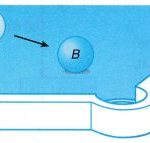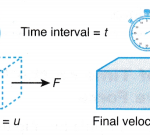Newton's Laws Of Motion (A) Newton's First Law of Motion A body can not change its state of motion by itself. If the object is at rest it will remain at rest and if it is in uniform motion, it continues to be in motion unless some external force is applied on it.Newton’s First Law of Motion states that if there is no net force acting on a body, its state of motion will … [Read more...] about Newton’s Laws Of Motion
Force
What is Law of Conservation of Momentum
Law of Conservation of MomentumAccording to law of conservation of momentum "if there is no force acting on a system, the momentum of the system remains unchanged." Generalizing the situation " if a group of bodies are exerting force on each other, their total momentum remains conserved before and after the interaction provided there is no external force acting on … [Read more...] about What is Law of Conservation of Momentum
How Impulse is Related to The Change in Momentum
Impulse of Force From the previous section, you have seen that Newtons Second Law can be summed up by the formula F = ma.When a net force acts on a body, it accelerates in the direction of the force. By definition, acceleration, a is the rate of change in velocity and is given by the formula:Since (mv - mu) is the change of momentum, therefore,or force is equal to … [Read more...] about How Impulse is Related to The Change in Momentum
How Do You Find Buoyant Force
How Do You Find Buoyant Force Buoyancy When a body is immersed in a liquid, the liquid exerts an upward force on the body called as the 'upthrust' or 'buoyant force.'Factors affecting upthrust: 1. Larger the volume of the body submerged in the liquid, greater is the upthrust. 2. Larger the density of the liquid, greater is the upthrust. Applying Archimedes' … [Read more...] about How Do You Find Buoyant Force
What Are The Examples Of Non Contact Forces
Examples Of Non Contact Forces Forces that do not need physical contact with the object on which they are acting are called non-contact forces. Gravitational force, electrostatic force, and magnetic force are examples of non-contact forces.Gravitational Force The force with which objects pull each other is called gravitational force. This force is very small and we can … [Read more...] about What Are The Examples Of Non Contact Forces




